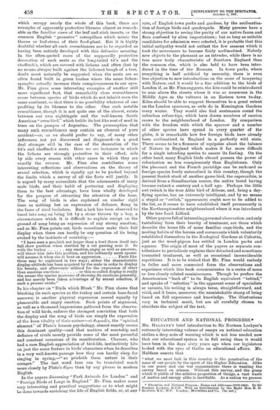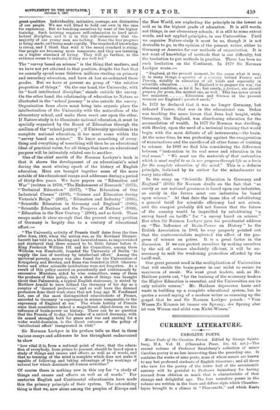EDUCATION AND NATIONAL PROGRESS.* Ma. FIALDANE'S brief introduction to Sir
Norman Lockyer's extremely interesting volume of essays on national education strikes a deep note of warning which is not less needed now that our educational system is in full swing than it would have been in the days sixty years ago when our legislators looked with the eyes of Gallic, on educational affairs. Mr. Haldane asserts that
"what we most lack in this country is the penetration of the mass of our people by the spirit of the Higher Education. Alike in our peace and our war organisations there is wanting the survey based on science.. Without this survey, and the grasp which it yields of the relative proportion of things, a vast waste of matter and energy alike is inevitable. As a nation we possess
• Education and National Progress: Essays and Addresses (1570-1906). By Sir Norman Lockyer, K.C.B. With an Introduction by the Bight lion. B. B. Haldane. K.C.. M.P. London : Macmillan and Co. 1-52. net.]
great qualities. Individuality, initiative, courage, are distinctive of our people. We are well fitted to hold our own in the race for supremacy. But we handicap ourselves by want of the higher training. Such training requires self-submission to hard intel- lectual discipline, and it is in this self-submission that the majority of our young men are lacking. None the less progress is being made, and being made rapidly. The standard of knowledge is rising, and I think that with it the moral standard is rising. Our people are becoming more temperate, and they are insisting on a higher standard of living. They will go further, so the evidence seems to indicate, if they are well led " The " survey based on science " is the thing that matters, and we have not yet attained to that position, despite the fact that we annually spend some thirteen millions sterling on primary and secondary education, and have at last co-ordinated these grades. But we have at present no grasp of " the relative proportion of things." On the one hand, the University, with its " hard intellectual discipline," stands outside the survey. On the other hand, the relationship of education to Nature as illustrated in the " school journey " is also outside the survey. Organisation from above must bring into organic place the intellectualism of the University with the naturalism of the elementary school, and make them react one upon the other. If Nature-study is to illuminate national education, it must be specially organised by the Board of Education through the medium of the " school journey " ; if University specialism is to complete national education, it too must come within the "survey based on science." To know something of every- thing and everything of something will then be an educational ideal of practical value, for all things that have an educational purpose will be intimately related one to another.
One of the chief merits of Sir Norman Lockyeis book is that it shows the development of an educationist's mind during the most stirring epoch of the history of English education. Here are brought together some of the more notable of his educational essays and addresses during a period of thirty-five years. We have papers on " Education and War" (written in 1870)," The Endowment of Research" (1873), " Technical Education" (1877), " The Education of Our Industrial Classes " (1883), " Science and Education during Victoria's Reign" (1887), "Education and Industry" (1895), "Scientific Education in Germany and England" (1896), "Scientific Education and the Progress of Nations" (1899), " Education in the New Century " (1901), and so forth. These essays make it clear enough that the present strong position of Germany is largely due to a century of educational effort :— " The University activity of Prussia itself dates from the time after Jena, 1806, when the nation was, as Sir Rowland Blenner- bassett has told us, a bleeding and lacerated mass, so impoverished and shattered that there seemed to be little future before it. King Frederick William III. and his Councillors, among them Wilhelm von Humboldt, founded the University of Berlin to supply the loss of territory by intellectual effort.' Among the universal poverty, money was also found for the Universities of Konigsberg and Breslau, and Bonn was founded in 1818. Observa- tories and other scientific institutions were not forgotten. As a result of this policy carried on persistently and continuously by successive Ministers, aided by wise councillors, many of them the products of this policy, such a state of things was brought about that Palmerston, a typical English statesman, is stated by Matthew Arnold to have defined the Germany of his day as a country of 'damned professors,' and so well have the damned professors done their work since that not long ago M. Ferdinand Lot, one of the most distinguished educationists of France, accorded to Germany 'a supremacy in science comparable to the supremacy of England at sea.' The whole history of Prussia since then constitutes indeed a magnificent object-lesson on the influence of brain-power on history. There can be no question that the Prussia of to-day, the leader of a united Germany, with its armed strength both for peace and war and craving for a wider world-dominion, is the direct outcome of the policy of `intellectual effort' inaugurated in 1806."
Sir Norman Lockyer in his preface tells us that in these various essays and addresses he has throughout endeavoured to show "how vital it is, from a national point of view, that the educa- tion of everybody, from prince to peasant, should be based upon a study of things and causes and effects as well as of words, and that no training of the mind is complete which does not make it capable of following and taking advantage of the workings of natural law which dominate all human activities."
Of course there is nothing new in this cry for " a study of things and causes and effects as well as of words." For centuries English and Continental educationists have made this the primary principle of their system. The astonishing thing is that we, now alone among the peoples of Europe and
the New World, are neglecting the principle in the lowest as well as in the highest grade of education. It is still words,
not things, in our elementary schools ; it is still to some extent words, and not applied principles, in our Universities. Until we organise Nature-study it must be so, though it is not desirable to go, in the opinion of the present writer, either to Germany or America for our methods of organisation. It is not want of knowledge of methods that is our difficulty, but the hesitation to put methods in practice. There has been no such hesitation on the Continent. In 1870 Sir Norman Lockyer wrote :— " England, at the present moment, be the cause what it may, is in many things a quarter of a century behind France and Prussia, notably in education of all kinds and especially in
scientific education If England is to prepare for war, the abnormal condition, so let it be ; but surely, a fortiori, she should prepare for peace, the normal one, as well. This has never struck
her ministers Education and Science at the present moment are England's greatest needs."
In 1873 he declared that it was no longer Germany, but defeated France, that was in the educational van. Sedan was teaching the same lesson that Jena bad taught, while Germany, like England, was abandoning education for the accumulation of wealth. In 1877 Sir Norman was dwelling, with Huxley, upon the need of a technical training that would begin with the most delicate of all instruments,—the brain. At the same time, he was protesting against the exaggeration of examinations and the sacrifice of all other forms of training to science. In 1883 we find him considering the difference between " instruction in its real sense and education in its real sense." " We must use the materials of that instruction which is most useful to us in our progress through life as a basis for the complete education of the mind." This is a definite principle, italicised by its author for the schoolmaster to carry into effect.
In the essay on "Scientific Education in Germany and England " (189G) Sir Norman dwells on the fact that " so surely as our national greatness is based upon our industries, as surely in the future must our industries be based
upon science." At that date the inane idea of substituting a general tariff for scientific efficiency had not arisen, and the essayist probably did not foresee that the future
of the country would be imperilled by substituting " a survey based on tariffs" for "a survey based on science." But when Sir Norman Lockyer gave his presidential address on "The Influence of Brain-Power on History" to the British Association in 1903, he very properly pointed out that the controversialists neglected the effect of the pro- gress of science on prices. It is a great factor in the discussion. If we can protect ourselves by making ourselves by the aid of science absolutely efficient, it will be un- necessary to seek the weakening protection afforded by the Our great present need is the multiplication of Universities that will enable the brain-power in our midst to secure its maximum of result. We want great leaders, and, as Mr. Haldane points out, "for the training of the necessary leaders the Higher Education is essential, and the Universities are its only reliable source." Mr. Haldane deprecates haste and waste in building up a complete educational system, but he quotes a sound saying of a modern writer as summing up the gospel that he and Sir Norman Lockyer preach : " Vow Wissen Zu Konnen ist immer ern Sprung; der Sprung aber ist vom Wissen and nicht vow Nicht-Wissen."































































 Previous page
Previous page